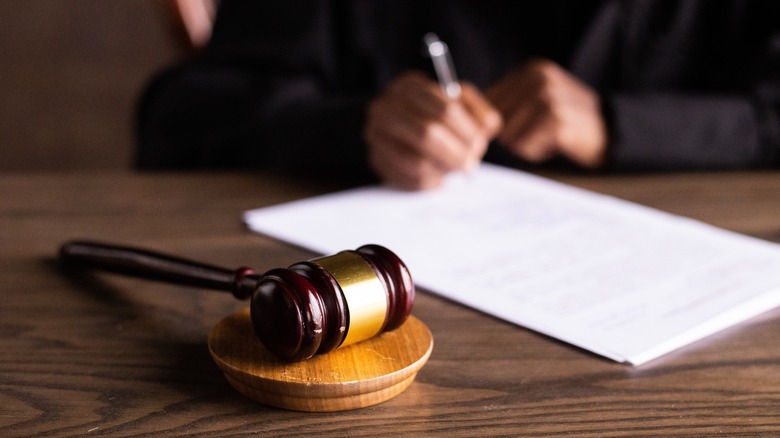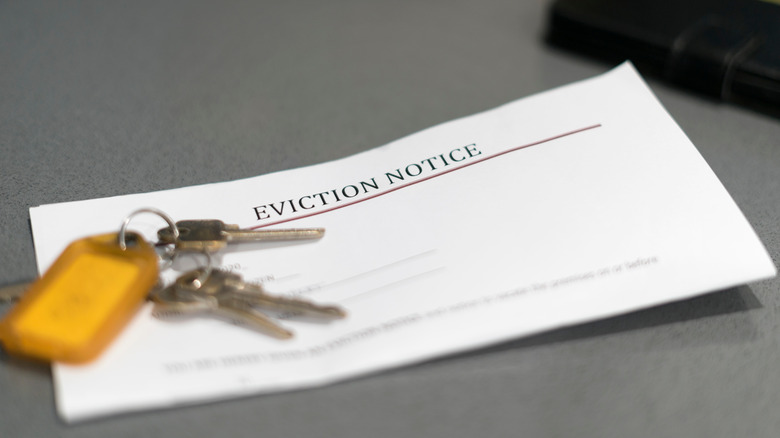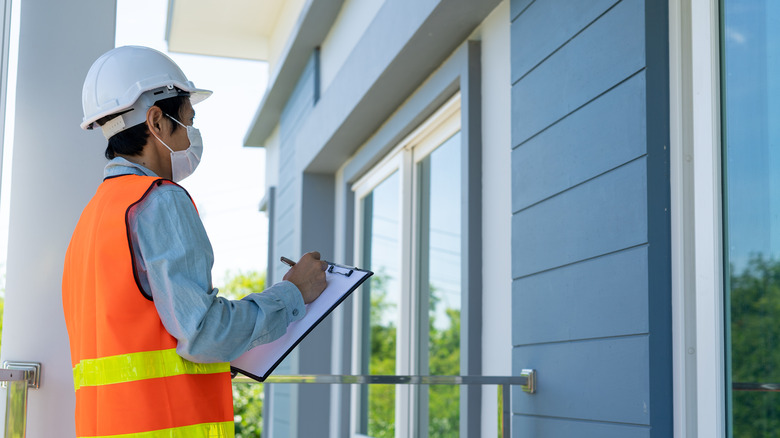Pros And Cons Of Purchasing A House With Tenants
A recent study by Harvard revealed that over 44 million people currently rent in the United States. With this statistic in mind, there is a possibility that a property you're considering purchasing already has tenants. Investing in a currently-occupied house, condo, or townhouse has pros and cons, and it can be an advantageous or unwise decision depending on your intentions. Remember, property management is a competitive market and you'll need to be knowledgeable to be successful and retain happy tenants (via Forbes).
If you want to become a landlord, buying pre-occupied property can save you a lot of time and effort while generating profit. However, some conditions come with your new title that you should be aware of. Becoming a landlord isn't as simple as one might think— you want to make sure you're prepared for the responsibilities and legal obligations involved. In contrast, if you want to own the home for yourself, pushing out the current tenants can be a lengthy process, especially if they are unwilling to leave. Here, you'll learn more below about the pros and cons of purchasing a home inhabited by renters, and how to deal with these factors accordingly.
Pro: You already have tenants and accompanying income
The most obvious advantage of purchasing a tenant-occupied home is that you become an immediate landlord. There is nearly instant income since you can start receiving rental payments as soon as your home purchase is completed. This income assists in offsetting your new mortgage, as you can use your tenant's rent to cover part or all of your monthly payment.
These earnings are essentially passive income, meaning you're making money with very little work on your end (via Steadily). Depending on how well the previous landlord had maintenance and tenant relations set up, it may take minimum effort to keep the house occupants happy and collect their money. Don't be afraid to ask the previous landlord to transfer any pest control, lawn care, and other services in your name, so you don't have to rebuild a maintenance schedule from scratch.
The closer you stick to the previous landlord's schedule and services, the easier the transition of ownership is for you and your new tenants. However, you should not follow this advice if you are unhappy about the state of the home or if your tenants voice their dislike of the current services used. Your new management may also be an opportunity to better life for your tenants and improve the state of the property.
Pro: You already know the property is habitable
When you invest in a rental property that's already occupied and have it properly inspected, there's no question that the property is in livable condition. It's recommended you hire a home inspector to ensure both the previous landlord and current tenants are not placing you in a legally liable situation. They'll help you ensure that the home complies with all applicable landlord-tenant laws, and evaluate other important factors of providing a living space (via Rocket Mortgage).
As a landlord, it's your duty to provide and maintain home systems. Buying an already occupied home likely means all these systems are installed and functioning, saving you a significant amount of time, effort, and money. However, you should keep in mind that not all landlords are morally good, law-abiding homeowners. It is possible that the previous landlord has not been keeping up with the property, which is what makes getting an inspection so imperative before you commit to a purchase.
Pro: The lease is already drawn up
One of the most complicated parts of becoming a landlord is drawing up a comprehensive and all-encompassing lease. The lease is an agreement between you and your tenant that permits them to live on your property for an allotted amount of time (via Bankrate). These agreements are formed during the extensive leasing process and can have a fixed term with a set end date, or be based on a month-month basis (via Zillow). Your lease must follow state-by-state regulations and should have additional disclosure attachments and a security deposit included. Outlining a lease requires legal assistance to ensure you cover all the bases, including utilities, services, terms, and rules you want to be included in your agreement. Landlords must also consider rules and permissions regarding smoking, pets, parking, and extra storage on their property.
When you purchase a home already inhabited by tenants, their lease remains in effect. The only difference is that you are now the responsible lessee instead of the previous property owner. The original lease and all its rulings carry over, saving you the trouble of drawing one up yourself. However, this does mean that you must abide by the rules in this pre-established contract even if you don't approve of them.
Pro: You receive pre-existing knowledge of the property's financial performance
The lease isn't the only paperwork that comes in handy during this transfer of ownership. The previous owner should have reports documenting monthly balances, income statements, accounts payable, accounts receivable, rent roll, and general maintenance costs that you can evaluate (via Luxury Property Care). Taking a look at these sheets gives insight into the property's financial performance and can help you set expectations for your income during the duration of your tenant's residency.
Depending on how long the property has been inhabited, you may be able to remove most of the guesswork from calculating your projected income, giving you more stability in your landlord position. This makes it easier to budget and charge affordable but profitable rent prices. According to Stessa, many real estate investors use software to track property performance. If you're lucky and the previous owner was technologically savvy, you can have this software data transferred to your own account upon purchasing a property.
Pro: You have freedom when the lease does expire or renew
If you don't intend on keeping tenants for the long haul, you are free to stop renting out your property when their lease is fulfilled. All leases, whether fixed-term or month-by-month, do come to an end, giving a landlord freedom to keep, change, or remove tenants. You should remember that it's not just your decision whether or not to keep tenants, they also have a say in whether they want to stay.
According to Rentec Direct, tenants may opt to move instead of renewing their lease due to changes made by their new landlord. If you perform more inspections, increase rates, or add rules regarding pets or smoking, your tenants may be encouraged to move out. Remember that not all tenants will mesh well with your management style. If you and your current tenants get along well, you may want to make choices that influence them to stay. You may not be able to charge rental rates as high with them as you would with new tenants, but you will have a reliable individual or family paying your monthly fees. It will also save you the trouble of finding new, acceptable tenants without any gaps in your profit.
Pro: You don't have to vet new tenants
Finding new tenants isn't simply a matter of finding people who can afford your property — you want to ensure you find reliable individuals that treat your home with respect and politely abide by your lease agreement. You should learn about the current tenants before you purchase an inhabited property. Do they pay rent on time, alert the landlord to maintenance issues, and ultimately follow the rules outlined in their lease agreement?
If this is the case, purchasing this property shouldn't pose as much of a risk. It'll save you the trouble of marketing your property, communicating with interested renters, checking identities, assessing criminal histories, and checking for prior evictions (via Steadily). You won't need to spend the time and resources it takes to thoroughly interview and evaluate new tenants. Purchasing a home is a massive expense, and most people prefer not to spend more money when they have a new mortgage under their belt. Acquiring decent tenants requires advertising your home and running background, credit, and eviction check reports, all of which cost money to do so properly.
Pro: Lessor-lessee relationship is already established
According to the Legal Information Institute, landlords (lessors) and tenants (lessees) are bound by contract and property laws. This institute defines lessors and lessees as being in four possible types of relationships. The first type is the Term of Years Tenancy, which is a fixed contract period. Type two is called Periodic Tenancy and is when a contract is automatically renewed. The third type is At Will and has no fixed ending period, continuing for as long as both parties wish to continue the contract. The final relationship type is At Sufferance which is when a tenant remains on a property beyond the length of their contract.
The type of relationship will be established if you purchase a property with renters already on site, and it will be protected by the covenant of quiet enjoyment which assures no one has superior authority to a current lease. With this established relationship, new landlords also have access to all of their tenant's legal information, including their name, social security number, birth date, current employers, etcetera (via Steadily). This means you'll have all the information you need on the current inhabitants to evaluate whether you want to continue the relationship, change the type, or change both the type and the tenants.
Con: Problem tenants can create a complicated situation
There are a number of things tenants can do to cause issues. At the end of the day, a landlord is responsible for making up lost income, fixing accidental and intentional damage, and solving other problems regarding their property. There is landlord insurance, but this service usually only covers accidental damages, meaning it won't protect you if you house disreputable people on your property (via Obierisk). Tenants may become problems if they dislike the change in land ownership or if they are nearing the end of their lease. You should be aware of this potential shift, so you can be ready to deal with it accordingly.
Many landlords require a security deposit, threaten eviction, or file lawsuits for damages to protect themselves from the financial detriment that rowdy tenants can cause (via Money Crashers). Don't ignore the resources around you when purchasing a property with current renters. You need to evaluate them as well as the home itself to ensure they won't become a problem for you in the future.
Con: The tenants themselves may not be the only problem
Taking on a landlord role is not as easy as many think. This position requires that you maintain a living space for other people, meaning you need to thoroughly monitor your building and property inside and out. Money Crashers explains that landlords must repair and upgrade fixtures, routinely compare their property to competing locations, and be diligent in negotiating renewals ahead of time. Neglecting these three tasks not only puts your tenants at risk but can also hinder your profits and lead to glaring issues with your property.
Pest infestations, roofing issues, and plumbing and electrical mishaps can start off as something small but quickly worsen into dangerous predicaments. These situations can diminish your property value and make you liable for legal lawsuits if you don't keep up with them. Unless you only plan to host tenants for seasonal periods or hire a property manager, being a landlord is a full-time job with no vacation days.
Con: If necessary, eviction is difficult and costly
If the tenants that come with your house end up not paying their dues or breaking their lease, you are legally able to evict them from your property. This process is not easy and requires giving them notice, taking court action, and going through with the eviction itself (via TransUnion Smartmove) You cannot evict the tenants even if you want them gone for your own reasons — their previous lease is binding and unbreakable. They must meet a clause for termination, such as having unapproved roommates or pets, causing property damage, or performing illegal activities on site. Otherwise, they will have legal grounds to sue you and resist the eviction (via American Apartment Owners Association).
If you do have the justification to evict the current residents, there will be many costs to take into account. You'll need to cover legal fees, court costs, financial damages, property damages, and any lost rent that occurs over the eviction process. This process could take several weeks, making it very time-consuming and detrimental to profits.
Con: You must honor the present lease
Unless your tenants behave in a way that allows you to break it, the current lease is set in stone until its end date. Investopedia warns new homeowners that leases stay attached even after estate ownership is transferred to a new individual. The only way out is to break the lease and pay the monetary expenses associated with doing so, or to renegotiate the terms with the current tenants.
Even if your negotiations are reasonable, the current residents on your property are not obligated to agree to them. This means you can't change their rules or establish new demands until the next leasing period begins. You also can't move onto the property yourself or allow anyone else to inhabit the area. The only way you might be able to alter the present lease is if there are terms in the original contract that state special terms if a property is bought out and ownership is transferred (via Rent Prep). Unless the previous landlord explicitly stated that a new property owner can make certain changes, there is not much you can do.
Con: You can inherit legal risks
Upon purchasing a property, you become legally responsible for its condition. This is why it is vital to get a proper inspection beforehand. You don't want to inherit any legal risks because the previous landlord wasn't properly upkeeping the property.
As a landlord, you must maintain the structural components like the electrical, plumbing, and HVAC systems. They must be operable and running correctly to ensure a building's inhabitants have a safe and healthy environment to live in (via Investopedia). If any of these systems are not up to code, you could be the person that gets sued and blamed for their inadequacy.
With this in mind, you should also know what landlords are responsible for. If you don't own other rental properties and this is your first time managing a lease agreement, you may not be privy to landlord obligations. You should know you are required to provide access to running water, regular trash removal, and other services depending on your location and local laws (via Justia).
Con: You may lose your tenants if you're inexperienced
You may purchase a home and think you got lucky to have pre-contracted tenants. However, if you don't have much experience in proprietorship, you may find it difficult to hold onto your tenants. Tenants can and will break their leases due to landlord conduct in an act known as constructive eviction (via Legal Information Institute).
They may choose to do so if you fail to adhere to your lease agreement by not repairing issues promptly, breaching pre-stated agreements, or allowing dangerous situations to occur on the property. Becoming a landlord can be overwhelming with the constant need to maintain a property, and if you can't keep up with your tenant's needs, they may not want to continue living in your property. Your current tenant will be gone and you'll need to fix any issues before you can move a new resident onto your property. This is stressful if finances are tight after purchasing the new property and you need the rental payments to help pay for your mortgage.
Con: You should invest in landlord insurance
Even if you don't intend on being a landlord long-term, it's highly recommended that you invest in landlord insurance. This insurance should cover fire damage, water damage, freezing pipes, hail, storms, and other natural disasters depending on your geographical location (via Obierisk). Going without this safeguard is highly risky and can cause extremely high monetary losses with no reprieve.
Since you're purchasing a property with pre-existing tenants, you should know that some insurance rates may be priced higher due to the condition of the property (via Steadily). Other factors that can increase your insurance rates are how common natural disasters occur, your rental amount, building features, and local crime rates. If you can't afford great insurance, you should know that it isn't your only solution to monetary losses that you may face as a landlord. You can also recoup lost money by adding a security deposit to your lease and filing lawsuits against unruly residents.














